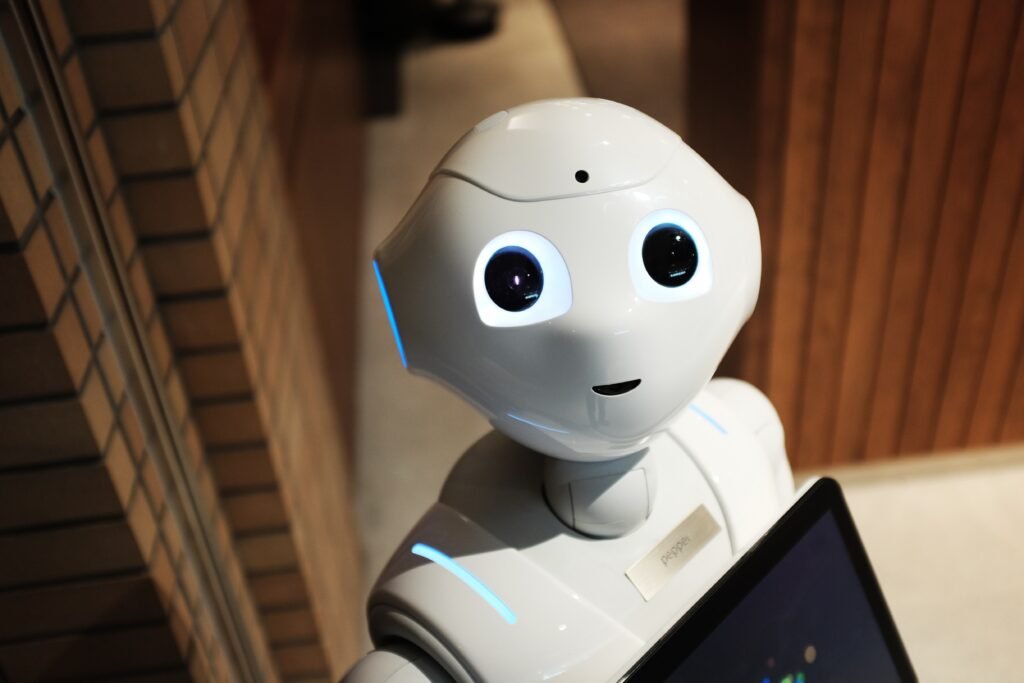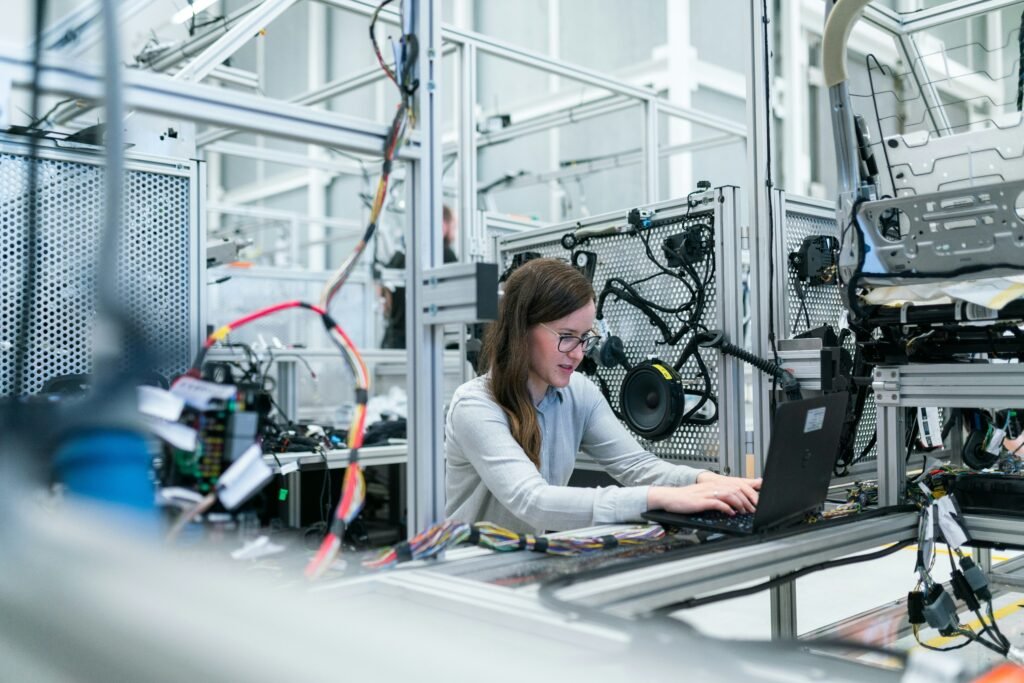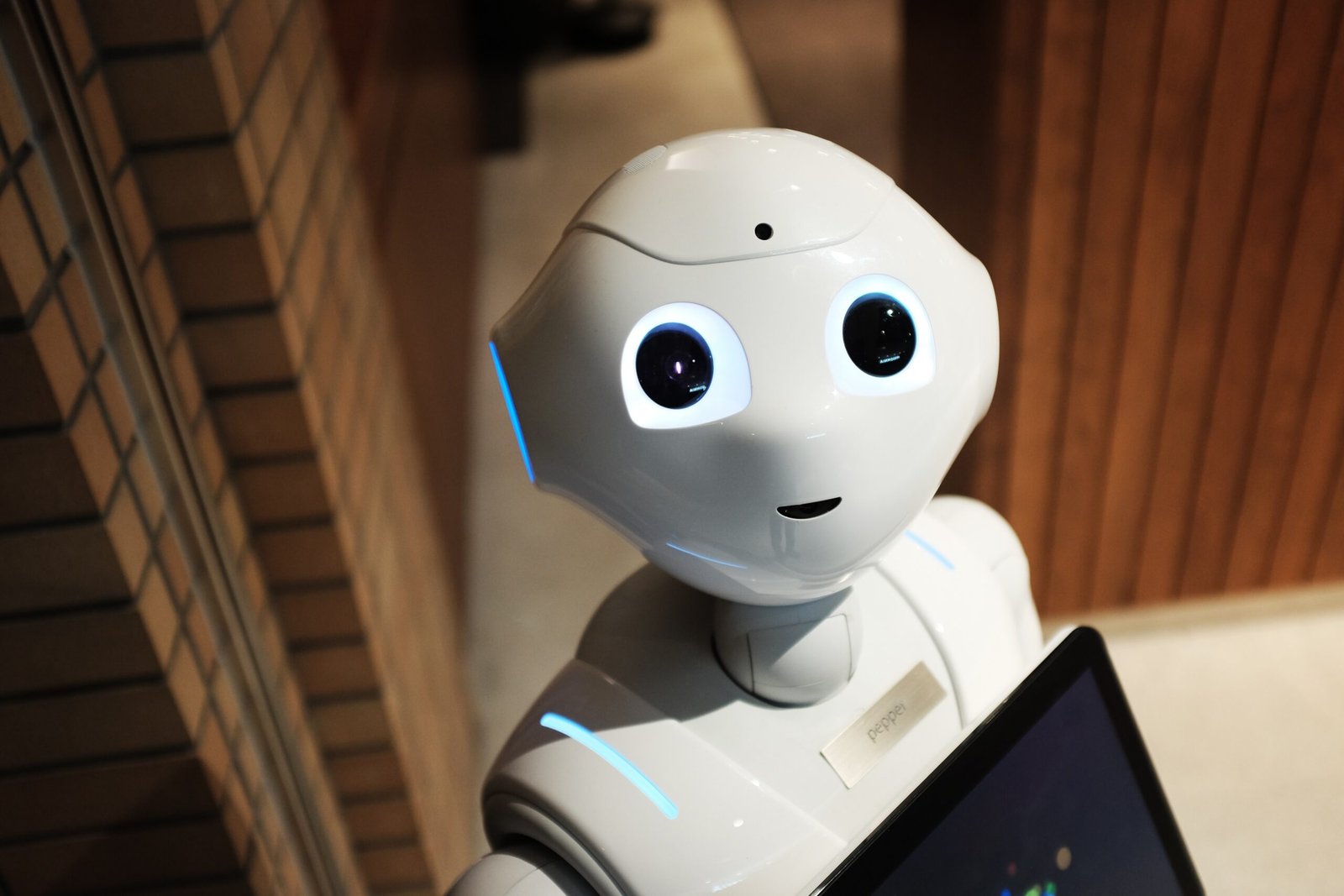Artificial Intelligence (AI) has already revolutionized various aspects of our lives, from digital assistants like Siri and Alexa to personalized recommendations on streaming platforms. But what lies ahead is an even more transformative future, where AI is poised to reshape industries, economies, and societies on a global scale. With its ability to analyze vast amounts of data, make autonomous decisions, and learn from experiences, AI is set to drive unprecedented advancements in healthcare, transportation, finance, and beyond. In this article, we will explore the promising ways in which artificial intelligence will change the world as we know it, leaving no aspect of our lives untouched by its remarkable potential. Get ready to embark on a captivating journey into an AI-powered future.
Automation of Jobs
Replacement of repetitive tasks
Artificial intelligence and automation technologies have the potential to replace monotonous and repetitive tasks that have been traditionally performed by humans. This shift allows individuals to focus on more complex and creative tasks that require human intelligence and decision-making. For example, in industries such as manufacturing and logistics, robots and automated systems can take over repetitive tasks like assembly or transportation, freeing up workers to engage in more strategic and innovative roles. This not only increases efficiency and productivity but also improves job satisfaction and overall work-life balance.
Transformation of job roles
As AI continues to advance, it is expected to transform job roles across various industries. In many cases, manual tasks that were once performed by humans will be automated, leading to significant changes in job responsibilities. However, this transformation also presents opportunities for individuals to upskill and reskill themselves to adapt to the changing job landscape. For instance, roles that require creativity, critical thinking, and problem-solving skills will become more valuable as the automation of routine tasks takes place. It is essential for individuals to embrace lifelong learning to stay relevant and thrive in the evolving job market.
Job displacement
While the automation of jobs brings numerous benefits, it is also likely to result in the displacement of certain job roles. Tasks that can be replicated by machines may no longer require human intervention, leading to a decrease in the demand for specific jobs. However, history has shown that technological advancements often create new opportunities and industries, leading to the creation of different job roles. Therefore, it is crucial for individuals and organizations to adapt to these changes by developing new skills and exploring emerging sectors to ensure continued employability.
Creation of new jobs
Although some job roles may be replaced by automation, the advent of artificial intelligence is also expected to create new job opportunities. With the rise of AI technologies, there will be a need for individuals who can develop, implement, and maintain these systems. Roles such as AI programmer, data scientist, and AI ethicist are likely to be in high demand. Additionally, as industries evolve and new sectors emerge, there will be a demand for individuals with specialized skills and knowledge. By embracing the changes brought about by AI, individuals can position themselves for these new and exciting job prospects.
Enhanced Healthcare
Precision medicine and personalized treatments
Artificial intelligence has the potential to revolutionize healthcare by enabling precision medicine and personalized treatments. AI algorithms can analyze vast amounts of patient data, including genetic information, medical history, and health records, to identify patterns and make accurate predictions. This information can then be used to develop tailored treatment plans that consider an individual’s unique genetic makeup, lifestyle, and medical background. By leveraging AI, healthcare providers can improve treatment outcomes and deliver more targeted and effective medical interventions.
Advanced diagnostics and early disease detection
AI-powered diagnostic systems have the potential to enhance disease detection capabilities and enable early intervention. Machine learning algorithms can be trained to analyze medical images, such as X-rays and MRIs, and identify potential abnormalities or signs of diseases. This can help healthcare professionals detect diseases at an early stage when they are more treatable and potentially prevent serious complications. Additionally, AI algorithms can analyze patient data and identify risk factors for certain conditions, allowing for proactive measures and personalized preventive care.
Efficient healthcare management
Artificial intelligence can streamline healthcare management processes, leading to increased efficiency and improved patient outcomes. AI-powered systems can analyze patient data, predict hospital readmissions, and identify potential medication errors, enabling healthcare providers to intervene and prevent adverse events. Furthermore, AI can facilitate automated appointment scheduling, optimize resource allocation, and enhance operational efficiency in healthcare facilities. By leveraging AI technologies, healthcare organizations can reduce costs, enhance patient care, and improve overall healthcare management.
Healthcare robotics and assistance
Robotic technologies powered by AI have the potential to transform healthcare delivery by providing assistance to healthcare professionals and patients. Robotic surgical systems can perform complex surgeries with greater precision and accuracy, reducing the risk of human errors. AI-powered robots can also assist in tasks such as patient monitoring, medication dispensing, and physical therapy. Additionally, AI-enabled chatbots and virtual assistants can provide personalized health advice, answer patient queries, and assist in medical diagnoses. By incorporating AI-driven robotics and assistance, healthcare can become more patient-centric, efficient, and accessible.

Revolutionizing Transportation
Self-driving vehicles and increased safety
Artificial intelligence is revolutionizing transportation through the development of self-driving vehicles. AI algorithms enable autonomous cars to sense and interpret their surroundings, make real-time decisions, and navigate safely without human intervention. The use of AI in self-driving vehicles has the potential to significantly reduce accidents caused by human error, making roads safer for everyone. Self-driving technology also has the potential to improve traffic flow, reduce congestion, and optimize transportation systems.
Optimized traffic management
AI can play a crucial role in optimizing traffic management and reducing congestion. Through real-time data collection and analysis, AI algorithms can identify traffic patterns and predict traffic congestion. This information can be used to optimize traffic signal timings, reroute vehicles to less congested routes, and provide real-time traffic updates to drivers. By leveraging AI for traffic management, transportation authorities can improve the efficiency of road networks, reduce travel times, and enhance the overall commuting experience.
Improved logistics and delivery systems
Artificial intelligence has the potential to transform logistics and delivery systems by optimizing routes, improving tracking capabilities, and enhancing efficiency. AI algorithms can analyze data on factors such as traffic conditions, weather, and delivery demands to determine the most efficient routes for transportation vehicles. Additionally, AI-powered algorithms can optimize delivery schedules, ensuring timely and cost-effective deliveries. This not only improves customer satisfaction but also reduces fuel consumption and carbon emissions associated with transportation.
Reduction of carbon emissions
As transportation is one of the major contributors to carbon emissions, the revolutionization of transportation through AI can contribute significantly to reducing environmental impact. Electric vehicles powered by AI technologies can offer efficient and sustainable alternatives to traditional combustion engines. AI algorithms can monitor and optimize energy consumption in vehicles, reducing fuel wastage and promoting eco-friendly driving behaviors. Additionally, AI can facilitate the development of shared mobility services, reducing the number of private vehicles on the road and further decreasing carbon emissions.
Smarter and More Efficient Cities
Intelligent urban planning
Artificial intelligence can enhance urban planning processes by analyzing vast amounts of data and providing valuable insights. AI algorithms can consider factors such as population density, transportation infrastructure, and environmental impact to optimize urban planning decisions. For example, AI can help identify the most suitable locations for public facilities, such as schools or hospitals, based on demographic data and transportation accessibility. By leveraging AI in urban planning, cities can become more sustainable, livable, and efficient.
Enhanced energy management
AI technologies can play a vital role in optimizing energy management and promoting sustainability in cities. AI algorithms can analyze energy consumption patterns, identify areas of inefficiency, and propose strategies for energy conservation. For instance, AI-powered systems can optimize the operation of smart grids, dynamically adjusting energy distribution based on demand and availability. Additionally, AI can facilitate the integration of renewable energy sources into the grid, improving the overall efficiency and reducing reliance on fossil fuels.
Waste management and recycling
Artificial intelligence can revolutionize waste management processes by enabling more efficient waste collection, sorting, and recycling. AI-powered systems can analyze data on waste generation patterns, population density, and infrastructure availability to optimize waste collection routes and schedules. Furthermore, AI algorithms can automate the sorting of recyclable materials, improving recycling rates and reducing the amount of waste sent to landfills. By incorporating AI into waste management practices, cities can achieve higher sustainability goals and reduce environmental pollution.
Smart infrastructure and utilities
The integration of AI into city infrastructure and utilities can lead to smarter and more efficient systems. AI-powered sensors can collect real-time data on factors such as water usage, energy consumption, and air quality, enabling proactive management of resources. For instance, AI algorithms can detect anomalies in water networks and predict potential leaks, allowing for timely repairs and reduced water loss. Additionally, AI can optimize the operation of public transportation systems, improving service reliability and reducing congestion. By embracing AI-driven smart infrastructure, cities can enhance the quality of life for their residents and promote sustainable development.

Transformed Customer Experience
Personalized recommendations and targeted marketing
Artificial intelligence can transform the customer experience by enabling personalized recommendations and targeted marketing strategies. By analyzing customer data, AI algorithms can identify individual preferences, behaviors, and purchasing patterns. This information can then be used to deliver personalized product recommendations, tailored advertisements, and customized offers. Through AI-powered recommendation systems, businesses can enhance customer satisfaction, increase sales, and foster long-term customer loyalty.
Improved customer service through chatbots
AI-powered chatbots have the potential to revolutionize customer service by providing efficient and personalized support around the clock. Chatbots equipped with natural language processing capabilities can understand and respond to customer inquiries, provide product information, and resolve common issues in real-time. This eliminates the need for customers to wait for human assistance, resulting in faster response times and improved customer satisfaction. Additionally, chatbots can handle a large volume of inquiries simultaneously, improving scalability and reducing customer service costs for businesses.
Virtual assistants and voice recognition
Virtual assistants powered by AI technologies can significantly enhance the customer experience by enabling hands-free, voice-activated interactions. AI-powered voice recognition algorithms can understand and interpret customer commands and queries, allowing for seamless and intuitive interactions. Virtual assistants can assist customers in tasks such as placing orders, providing product information, or scheduling appointments. By incorporating virtual assistants into customer service operations, businesses can improve accessibility, convenience, and overall customer satisfaction.
Seamless shopping experiences
Artificial intelligence can enable seamless and personalized shopping experiences across online and offline channels. AI algorithms can analyze customer data, such as browsing history, purchase patterns, and social media interactions, to provide tailored product recommendations and promotions. Additionally, AI-powered technologies, such as facial recognition and augmented reality, can enhance the offline shopping experience by enabling personalized interactions and virtual try-on capabilities. By leveraging AI to create seamless shopping experiences, businesses can attract and retain customers in an increasingly competitive market.
Advancements in Education
Customized learning experiences
Artificial intelligence can revolutionize education by enabling customized learning experiences for students. AI algorithms can analyze student data, such as learning preferences, strengths, and weaknesses, to develop personalized learning paths. This can include adaptive learning platforms that adjust content and difficulty based on the student’s individual needs. By tailoring education to each student, AI can improve learning outcomes, engagement, and overall educational experience.
Efficient administrative tasks
AI technologies can automate administrative tasks in educational institutions, reducing administrative burdens and improving efficiency. For example, AI-powered systems can manage student records, generate reports, and handle routine administrative processes, freeing up teachers and administrators to focus on core educational activities. Additionally, AI can facilitate automated grading, providing timely feedback to students and reducing the time spent on manual grading tasks. By streamlining administrative tasks, AI enables educators to allocate more time and resources to student learning and support.
Smart tutoring and adaptive feedback
AI-powered tutoring systems can provide personalized and adaptive support to students. By analyzing student performance data, AI algorithms can identify areas of weakness and provide targeted feedback and guidance. AI tutors can adapt their teaching strategies and content delivery based on each student’s learning pace and style, promoting effective and efficient learning. Additionally, AI-enabled tutoring systems can offer interactive and engaging learning experiences, enhancing student motivation and knowledge retention.
Enhanced accessibility and inclusivity
Artificial intelligence has the potential to enhance accessibility and inclusivity in education. AI technologies can assist students with disabilities by providing specialized tools and support. For example, speech recognition technology can enable students with hearing impairments to participate in classroom discussions, while text-to-speech and visual aids can assist students with visual impairments. Furthermore, AI can facilitate translation services, enabling multilingual students to learn in their preferred language. By leveraging AI to remove barriers and promote inclusivity, education can become more accessible and empowering for all students.

Heightened Cybersecurity
Enhanced threat detection and prevention
Artificial intelligence can enhance cybersecurity by enabling advanced threat detection and prevention mechanisms. AI algorithms can analyze vast amounts of data, including network traffic, user behavior, and system logs, to identify potential security threats in real-time. By continuously monitoring and analyzing patterns, AI-powered systems can detect anomalies and potential cyber attacks that may go unnoticed by traditional security measures. This enables proactive measures to be taken, including timely incident response and prompt mitigation of security vulnerabilities.
Improved data protection
AI technologies can improve data protection by strengthening encryption methods and enhancing data privacy measures. AI algorithms can detect patterns and vulnerabilities in data storage and transmission, allowing for the development of more robust encryption protocols. Additionally, AI-powered systems can evaluate and monitor data access permissions, ensuring that sensitive information is only accessible to authorized personnel. By leveraging AI for data protection, organizations can enhance their security posture and mitigate the risk of data breaches and unauthorized access.
Automated security monitoring
AI-powered security monitoring systems can automate the detection and response to security incidents, reducing the reliance on manual monitoring and human intervention. Using machine learning algorithms, AI systems can analyze network traffic, system logs, and user behavior to identify potential security threats and malicious activities. This enables organizations to respond rapidly to security incidents, minimizing the impact and reducing the time to resolve security breaches. Additionally, AI systems can provide real-time alerts and generate detailed reports, facilitating proactive security measures and improving overall cybersecurity posture.
Safe and secure digital transactions
Artificial intelligence can enhance the security of digital transactions by enabling robust authentication and fraud detection mechanisms. AI-powered algorithms can analyze user behavior, device information, and transaction patterns to identify and prevent fraudulent activities. This can include the use of biometric authentication, such as fingerprint or facial recognition, to ensure the identity of individuals during digital transactions. By leveraging AI for secure digital transactions, organizations can protect customer data, prevent financial losses, and build trust in online transactions.
Accelerated Scientific Research
Data analysis and pattern recognition
Artificial intelligence can accelerate scientific research by enabling efficient data analysis and pattern recognition. With the vast amounts of research data available, AI algorithms can analyze and extract valuable insights from complex datasets, reducing the time and effort required for manual analysis. Machine learning algorithms can identify patterns and correlations in scientific data, facilitating discoveries and advancing research across various disciplines. By automating data analysis, AI empowers scientists to focus on developing new hypotheses and conducting more impactful research.
Drug discovery and development
AI technologies have the potential to revolutionize drug discovery and development processes. AI algorithms can analyze vast databases of chemical compounds and predict their potential therapeutic properties, enabling more efficient and targeted drug discovery. Additionally, AI-powered systems can simulate and predict the effects of drug candidates on biological systems, reducing the time and cost associated with traditional trial-and-error approaches. By accelerating the drug discovery process, AI can facilitate the development of novel treatments and therapies for various diseases.
Simulation and optimization
Artificial intelligence can enable advanced simulation and optimization algorithms, transforming scientific research and decision-making. AI-powered simulations can model complex systems, such as weather patterns or biological processes, providing valuable insights and predictions. These simulations can be used to optimize parameters and test hypotheses in a virtual environment, reducing the need for costly and time-consuming physical experiments. By leveraging AI for simulation and optimization, scientists can accelerate research, gain a deeper understanding of complex systems, and make data-driven decisions.
Faster scientific breakthroughs
Artificial intelligence can accelerate scientific breakthroughs by enabling faster data processing and analysis. AI algorithms can analyze research papers, scientific literature, and vast amounts of data to identify trends, connections, and new research directions. Additionally, AI-powered systems can assist in literature reviews, summarizing and organizing relevant information for researchers. By leveraging AI for data processing and analysis, scientists can quickly access relevant information, collaborate more effectively, and make scientific breakthroughs more efficiently.
Transformed Agriculture and Food Industry
Precision farming and crop optimization
Artificial intelligence has the potential to transform agriculture by enabling precision farming techniques and optimizing crop production. AI-powered systems can analyze data from sensors, drones, and satellite imagery to monitor crop health, soil moisture levels, and pest infestations. This enables farmers to make data-driven decisions regarding irrigation, fertilizer application, and pest control, resulting in higher crop yields and reduced environmental impact. By adopting AI-powered precision farming practices, the agricultural industry can achieve greater sustainability and meet the global demand for food.
Automated harvesting and processing
AI-driven automation technologies can revolutionize the harvesting and processing of crops, increasing efficiency and reducing labor-intensive tasks. AI-powered robots and drones can perform tasks such as fruit picking, weed removal, and crop monitoring, minimizing the need for manual labor. Additionally, AI algorithms can analyze crop quality and optimize sorting and processing techniques, ensuring consistent and high-quality products. By automating harvesting and processing tasks, the agricultural industry can improve productivity, reduce labor costs, and enhance overall efficiency.
Improved supply chain management
Artificial intelligence can enhance supply chain management in the agriculture and food industry by improving logistics, reducing waste, and ensuring product quality. AI algorithms can analyze data on transportation routes, demand patterns, and shelf life requirements to optimize supply chain operations. This includes optimizing transportation routes, reducing food spoilage through real-time monitoring, and ensuring timely delivery to consumers. By incorporating AI into supply chain management, the agriculture and food industry can reduce costs, minimize waste, and improve customer satisfaction.
Reduced food waste
AI technologies can play a significant role in reducing food waste throughout the entire food supply chain. AI-powered systems can monitor and analyze data on factors such as temperature, humidity, and storage conditions to detect potential spoilage or quality deterioration. By providing real-time alerts and predictions, AI algorithms can help prevent food waste by enabling timely interventions, such as adjusting storage conditions or redirecting products nearing expiration. Additionally, AI can assist in demand forecasting, enabling better inventory management and reducing the likelihood of overproduction. By leveraging AI to combat food waste, the agriculture and food industry can contribute to global sustainability efforts and address food security challenges.
Ethical and Societal Implications
Impact on employment and income inequality
The widespread adoption of artificial intelligence is likely to have significant impacts on employment and income inequality. While AI has the potential to automate certain job roles, leading to job displacement, it can also create new opportunities and industries. However, it is crucial to address potential inequalities and ensure that the benefits of AI are shared equitably. This may involve implementing retraining and reskilling programs, fostering entrepreneurship, and promoting inclusive policies to minimize the negative impacts on employment and income distribution.
Ethics in decision-making algorithms
As artificial intelligence is increasingly used to make critical decisions, it is essential to address the ethical implications of AI algorithms. The decisions made by AI systems can have far-reaching consequences in areas such as healthcare, criminal justice, and finance. Ensuring that AI algorithms are fair, transparent, and accountable is crucial to prevent biases, discrimination, and unfair outcomes. Developing ethical frameworks and guidelines for AI development and deployment is vital to navigate the ethical challenges posed by AI technologies.
Privacy concerns and data protection
The widespread use of artificial intelligence requires the collection and analysis of vast amounts of personal data. This raises concerns regarding privacy and data protection. It is crucial to implement robust data protection measures and ensure that individuals have control over their personal information. Additionally, transparency in data collection and usage practices is essential to build trust between users and AI systems. Strengthening privacy regulations and promoting responsible data practices can help address privacy concerns and protect individuals’ rights in the AI-driven world.
Addressing biases and discrimination
Artificial intelligence systems are only as unbiased as the data they are trained on. Biases present in training data can lead to discriminatory outcomes in AI decisions. It is essential to address and mitigate biases in AI algorithms to ensure fairness and prevent the reinforcement of societal inequalities. This involves collecting diverse and representative data, implementing fairness metrics in AI systems, and conducting regular audits to detect and correct biases. By actively addressing biases and discrimination, society can harness the full potential of AI technologies while ensuring equal opportunities and treatment for all individuals.
In conclusion, artificial intelligence is poised to bring about significant transformations across various domains. From the automation of jobs and enhanced healthcare to revolutionizing transportation and smarter cities, AI technologies have the potential to revolutionize industries, improve customer experiences, advance scientific research, and contribute to a sustainable future. However, it is essential to address ethical and societal implications, promote inclusivity, and ensure responsible development and deployment of AI technologies. The future impacts of AI are vast, and it is up to individuals, organizations, and policymakers to shape its trajectory for the betterment of humanity.






